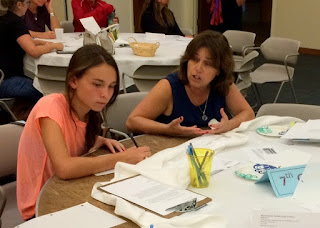 |
| Joy Dinaro, chair of the Education Committee |
Participants had an opportunity to learn about hunger in New Mexico and about feeding programs like the Rio Grande Food Project. There was also a chance to converse about hunger in small groups and to engage in advocacy by writing letters to Congress. This was the fourth Hunger 101 workshop since the Interfaith Hunger Coalition was created a few years ago, and each has had its own personality. This one was designed especially for youth, who readily engaged in discussions and listened intently to the presentations.
 |
| (Photo: Ellen Buelow) |
Students deal with so many issues at school, hunger should not be one of them. But sadly, it is. In a recent report, three out of five teachers say students regularly come to school hungry. More than half of teachers say their students rely on school meals as their primary source of nutrition. Sarah, a public school student, shared with her teacher that she does not look forward to school vacations because she knows that it is hard for her parents to afford three meals a day for the whole family especially at the end of the month.
The importance of Advocacy
Participants learned that an important part of addressing hunger is to engage in advocacy. There were sample letters at each table, and the youth and adults were asked to take the information and put it in their own words. According to Ellen Buelow, chair of the IHC Advocacy Committee, the youth and adults wrote a total of 32 letters to Rep. Michelle Lujan Grisham urging her to protect nutrition programs.
 |
| (Photo: Ellen Buelow) |
Ari Herring, director of the Rio Grande Food Project (RGFP), told the youth and adults about the largest food pantry on Albuquerque’s west side. RGFP offers hungry households a chance to pick up a week’s worth of food once a month. The pantry distributes frozen as well as fresh fruits and vegetables, dairy products, frozen meats, beans and rice, breads and dry and canned goods. The clients In addition to our monthly food box program, the food pantry provides weekly groceries to medically-referred clients who are food insecure and have a chronic health condition that is related to hunger. We offer these clients low-sodium and low-sugar canned goods, whole grains, lean proteins and unlimited fresh fruits and vegetables. This Food for Health program addresses chronic health conditions through improved nutrition and household education on eating habits.
 |
| Rachel Sternheim, Rabbi Harry Rosenfeld (Photo Ari Herring) |
Rabbi Harry Rosenfeld and Cantor Barbara Finn set the tone for the workshop with a prayer. As part of the prayer, Rabbi Rosenfeld sounded the traditional shofar (ram's horn), which is a call for a Holy assembly and a time to repent and be pro-active not just pray.
Rachel Sternheim, education director at Congregation Albert, gave the introduction to the event and also helped prepare the program, in conjunction with our education and advocacy committees.
Here is an excerpt from a document put together by the the Religious Action Center of Reform Judaism. The quote reflects the rabbinic perspective on addressing hunger and poverty. The quote was not part of the program, but I thought it was an appropriate way to end the blog post.
God says to Israel, “My Children, whenever you give sustenance to the poor, I impute it to you as though you gave sustenance to Me.” Does God then eat and drink? No, but whenever you give food to the poor, God accounts it to you as if you gave food to God. Midrash Tannaim on Deuteronomy 15:10, citing Numbers 28:2

No comments:
Post a Comment